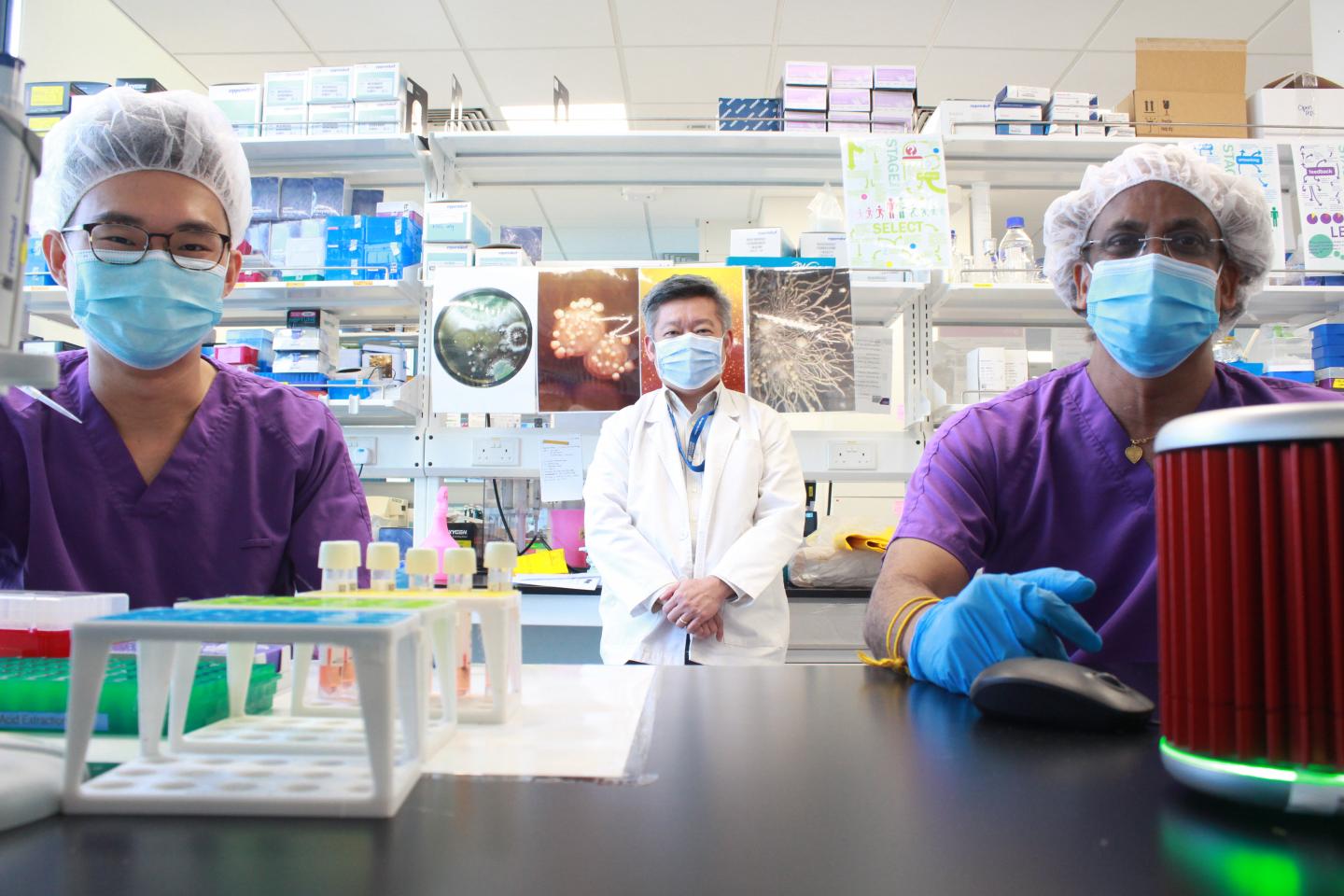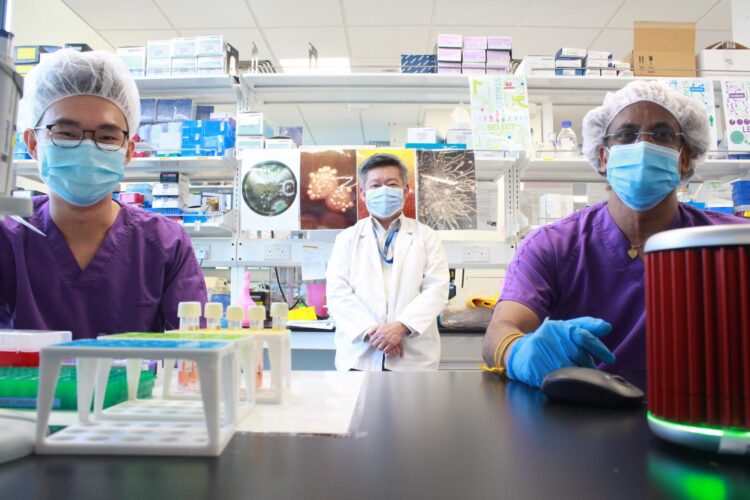Portable test produces results in 36 minutes; works for dengue and other viruses as well

Credit: NTU Singapore
Clinician-scientists at Nanyang Technological University, Singapore’s (NTU Singapore) Lee Kong Chian School of Medicine (LKCMedicine) have demonstrated a way to improve the speed, handling time and cost of COVID-19 laboratory tests. The improved testing method yields results in 36 minutes – a quarter of the time required by existing gold-standard tests.
Their new approach could enable the wider adoption of COVID-19 testing for diagnosis in academic or research laboratories, and allow for screening and research especially in countries and regions with limited laboratory capabilities. The test, which can be done with portable equipment, could also be deployed in the community as a screening tool.
Currently, the most sensitive method for testing for COVID-19 is through a laboratory technique called polymerase chain reaction (PCR), in which a machine amplifies viral genetic material by copying it over and over again so any trace of the SARS-CoV-2 virus can be detected.
A big bottleneck in sample testing is RNA purification – separating RNA from other components in the patient sample – a laborious process that requires chemicals that are now in short supply worldwide. Its steps have to be performed by highly trained technical staff and can take a few hours. Currently, automated equipment for sample preparation costs hundreds of thousands of dollars, and requires specialised laboratory facilities.
The method developed by NTU LKCMedicine combines many of these steps and allows direct testing on the crude patient sample, cutting down the turnaround time from sample-to-result, and removing the need for RNA purification chemicals.
Details of the new approach were published in the scientific journal Genes in June.
Mr Wee Soon Keong, a PhD candidate at NTU LKCMedicine and the first author of the paper, said: “While polymerase chain reaction (PCR) is a venerable technology that has proven to be a workhorse for biological research, it has some drawbacks when used outside of the laboratory environment. The process is fiddly and time-consuming. Our rapid COVID-19 test involves a single-tube reaction that reduces hands-on time and biosafety risk for lab personnel, as well as the likelihood for carryover contamination during the processing of samples.”
Aside from testing for COVID-19, the same method developed by the NTU LKCMedicine team can also be used to detect other viruses and bacteria, including the dengue virus, which is set to plague Singapore as the country braces itself for one of the worst dengue outbreaks amid the coronavirus pandemic.
Leader of the research team, Associate Professor Eric Yap, who also heads the Microbial Genomics Laboratory, said: “We previously demonstrated that this method works for dengue virus as well. When used directly on a crude blood sample with dengue virus, the test yielded results in 28 minutes. As Singapore battles the dual outbreak of dengue and COVID-19, both with similar early symptoms, our test could help in differentiating between the two infectious diseases.”
Professor James Best, Dean of NTU LKCMedicine, said: “As Singapore continues with proactive testing to detect, isolate, and contain the possible spread of the coronavirus, rapid portable screening tools like the one developed by Assoc Prof Yap and his team could come in handy at testing sites in the community, allowing for infected patients to be identified quickly, and swift action to be taken to prevent transmission.”
From benchtop to portable testing
Typically, in PCR tests, the genetic material on a swab sample collected from a patient has to be extracted to remove any substances in the sample that prevent the PCR test from working. An example of an inhibitor in respiratory samples is mucin (a main component of mucus).
The test designed by the NTU LKCMedicine team, which includes senior research fellow Dr Sivalingam Paramalingam Suppiah, uses the ‘direct PCR’ method, removing the need for RNA purification, a time-consuming and costly step. Instead, they added inhibitor-resistant enzymes and reagents targeting compounds that obstruct RNA amplification, such as mucin, a main component of mucus. These enzymes and reagents, which are commercially available, have high resistance to such compounds that otherwise inhibit PCR, rendering the test inaccurate.
The biochemical mix of crude sample and inhibitor-resistant enzymes and reagents is placed into a single tube, which is inserted into a laboratory thermocycler, a machine used to amplify genetic material in PCR. After 36 minutes, results reveal whether there is any trace of COVID-19 with confidence.
“By skipping the RNA extraction step with our direct-PCR method, we see cost savings on nucleic acid extraction kits, and avoid the problem of reagents in short supply when lab testing is ramped up and the demand increases globally,” said Dr Sivalingam.
The team also tested this method on a portable thermocycler, which can be deployed in low-resource settings and endemic areas, pointing to the possibility of having this test done in community healthcare settings by frontline healthcare workers.
Assoc Prof Yap said: “We are now trying to deploy such direct-PCR methods, developed by ourselves and others, for routine diagnostics. We need to determine the actual utility and benefits in a real-world setting, and to understand if there are any trade-offs. When one bottleneck is removed, other challenges may emerge – like ensuring quality control, or reducing manual errors.”
The team is now looking to use this method for COVID-19 testing at the NTU Clinical Diagnostic Laboratory at LKCMedicine that Assoc Prof Yap heads.
“Our goal is to develop ultrafast and automated tests that yield results in minutes, and that can be performed by healthcare workers in the clinic with similar accuracy and sensitivity as in specialised laboratories. This will allow us to take PCR testing out of conventional laboratories nearer to the point-of-care, and into the low-resource settings that need them the most,” he said.
###
Note to Editors:
Paper ‘Rapid Direct Nucleic Acid Amplification Test Without RNA Extraction for SARS-CoV-2 Using a Portable PCR Thermocycler’ published in Genes 2020, 11(6), 664
doi.org/10.3390/genes11060664
Paper ‘Direct RT-PCR detection of Dengue 1-4 virus from crude samples for rapid point-of-care diagnosis’ presented at the Proceedings of the SingHealth Duke-NUS Scientific Congress, Singapore, 23-24 September 2016
Media contact:
Foo Jie Ying
Manager, Corporate Communications Office
Nanyang Technological University
Email: [email protected]
About Nanyang Technological University, Singapore
A research-intensive public university, Nanyang Technological University, Singapore (NTU Singapore) has 33,000 undergraduate and postgraduate students in the Engineering, Business, Science, Humanities, Arts, & Social Sciences, and Graduate colleges. It also has a medical school, the Lee Kong Chian School of Medicine, set up jointly with Imperial College London.
NTU is also home to world-class autonomous institutes – the National Institute of Education, S Rajaratnam School of International Studies, Earth Observatory of Singapore, and Singapore Centre for Environmental Life Sciences Engineering – and various leading research centres such as the Nanyang Environment & Water Research Institute (NEWRI) and Energy Research Institute @ NTU (ERI@N).
Ranked amongst the world’s top universities by QS, NTU has also been named the world’s top young university for the past seven years. The University’s main campus is frequently listed among the Top 15 most beautiful university campuses in the world and it has 57 Green Mark-certified (equivalent to LEED-certified) building projects, of which 95% are certified Green Mark Platinum. Apart from its main campus, NTU also has a campus in Singapore’s healthcare district.
For more information, visit http://www.
Media Contact
Foo Jieying
[email protected]
Original Source
https:/





